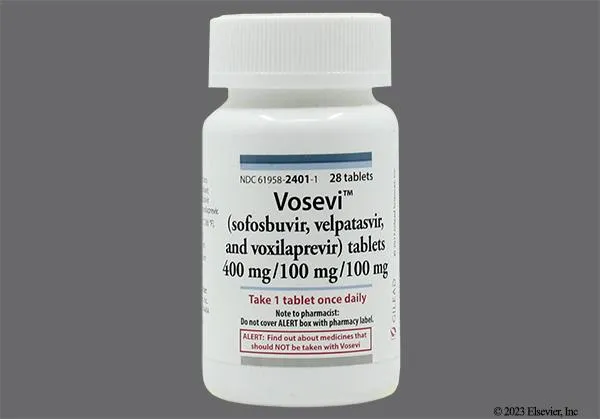Comprehensive Guide to Voxilaprevir: Uses, Dosage, Side Effects, and More
1. What is Voxilaprevir?
2. Overview of Voxilaprevir
Generic Name
Voxilaprevir
Brand Name
Vosevi (combination with sofosbuvir and velpatasvir)
Drug Group
NS3/4A protease inhibitor (antiviral)
Commonly Used For
This medication is used to:
- Treat chronic hepatitis C virus (HCV) infection.
- Manage HCV with prior treatment failure.
- Achieve sustained virologic response (SVR).
Key Characteristics
- Form: Oral tablets (100 mg voxilaprevir, combined with 400 mg sofosbuvir and 100 mg velpatasvir) (detailed in Dosage section).
- Mechanism: Inhibits HCV NS3/4A protease, preventing viral polyprotein processing.
- Approval: FDA-approved (2017 for Vosevi) and EMA-approved for HCV treatment.

3. Indications and Uses of Voxilaprevir
Voxilaprevir is indicated for HCV management across diverse patient populations, leveraging its pan-genotypic efficacy:
- Chronic Hepatitis C Virus (HCV) Infection: Treats HCV genotypes 1–6 in adults with or without cirrhosis, achieving SVR12 in ≥95% of cases when combined with sofosbuvir and velpatasvir, per AASLD/IDSA guidelines.
- HCV with Prior Treatment Failure: Manages HCV in patients who failed prior DAA therapy (e.g., NS5A inhibitors), offering a salvage option, supported by POLARIS-1 and POLARIS-4 trials.
- HCV with Compensated Cirrhosis: Treats HCV in patients with Child-Pugh A cirrhosis, improving liver function and reducing fibrosis, under hepatology supervision.
- HCV/HIV Co-Infection: Used in patients with concurrent HIV, optimizing ART and HCV therapy, with evidence from infectious disease cohorts.
- HCV Post-Liver Transplant: Employed off-label to treat recurrent HCV in liver transplant recipients, preventing graft loss, supported by transplant hepatology studies.
- HCV with Decompensated Cirrhosis: Investigated off-label in Child-Pugh B/C patients, improving survival with cautious use, with emerging data from advanced liver disease research.
- Acute Hepatitis C: Explored off-label for acute HCV infection, shortening treatment duration, with preliminary infectious disease evidence.
- HCV in Hemodialysis Patients: Managed off-label in patients with end-stage renal disease, adjusting doses, supported by nephrology and hepatology collaboration.
- HCV with Hepatocellular Carcinoma (HCC): Used off-label pre- or post-HCC treatment to control viral load, enhancing oncology outcomes, with ongoing trials.
- Pediatric HCV: Investigated off-label in children (12+ years) with HCV, adapting adult regimens, with pediatric hepatology data in development.
Note: This drug is part of a fixed-dose combination; consult a healthcare provider for resistance testing and monitoring.
4. Dosage of Voxilaprevir
Important Note: The dosage of this NS3/4A protease inhibitor must be prescribed by a healthcare provider. Dosing is fixed in combination with sofosbuvir and velpatasvir, with adjustments based on clinical evaluation.
Dosage for Adults
- Chronic HCV (Genotypes 1–6):
- 100 mg voxilaprevir, 400 mg sofosbuvir, and 100 mg velpatasvir once daily with food for 12 weeks.
- HCV with Prior DAA Failure:
- Same regimen (100 mg/400 mg/100 mg) once daily with food for 12 weeks, regardless of genotype.
- With Compensated Cirrhosis:
- 100 mg/400 mg/100 mg once daily with food for 12 weeks.
Dosage for Children
- 12–17 years (≥30 kg):
- 100 mg/400 mg/100 mg once daily with food for 12 weeks, under pediatric hepatologist supervision.
- Not recommended under 12 years or <30 kg.
Dosage for Pregnant Women
- Pregnancy Category B: Limited data; use only if benefits outweigh risks. Consult an obstetrician, with fetal monitoring and viral load assessment.
Dosage Adjustments
- Renal Impairment: No adjustment needed; use with caution if eGFR <30 mL/min/1.73 m², monitor closely.
- Hepatic Impairment:
- Mild (Child-Pugh A): No adjustment; moderate (Child-Pugh B): Use caution; severe (Child-Pugh C): Avoid.
- Elderly: Start with standard dose; monitor for side effects.
- Concomitant Medications: Adjust if combined with P-gp or CYP3A inducers (e.g., rifampin), reducing efficacy.
Additional Considerations
- Take this active ingredient with food to enhance bioavailability (e.g., a meal or snack).
- Complete the full 12-week course to prevent resistance.
5. How to Use Voxilaprevir
- Administration:
- Swallow tablets whole with a meal or snack, using water; avoid crushing or splitting.
- Take as part of the Vosevi combination, maintaining the same daily schedule.
- Timing: Use once daily with food, preferably at the same time each day.
- Monitoring: Watch for fatigue, jaundice, or signs of liver issues (e.g., dark urine).
- Additional Tips:
- Store at 20–25°C (68–77°F), protecting from moisture and heat.
- Keep out of reach of children due to toxicity risk.
- Report severe headache, abdominal pain, or signs of allergic reaction immediately.
6. Contraindications for Voxilaprevir
This drug is contraindicated in:
- Hypersensitivity: Patients with a known allergy to Voxilaprevir, sofosbuvir, velpatasvir, or their components.
- Severe Hepatic Impairment: Contraindicated in Child-Pugh Class C due to toxicity risk.
- Concurrent Use with Certain Drugs: Avoid with strong P-gp or CYP3A inducers (e.g., rifampin, St. John’s wort).
7. Warnings & Precautions for Voxilaprevir
General Warnings
- Hepatotoxicity: Risk of liver injury or decompensation; monitor liver function regularly.
- Drug Resistance: Risk with incomplete treatment; ensure adherence.
- Bradycardia: Risk when combined with amiodarone; monitor heart rate.
- Renal Impairment: Monitor in severe cases; adjust if necessary.
- Immune Reconstitution: Rare inflammation in co-infected patients; assess closely.
Additional Warnings
- Fatigue and Headache: Common but persistent in some cases; evaluate for underlying causes.
- Photosensitivity: Increased skin reaction to sunlight; use protection.
- Depression: Rare mood changes; monitor mental health.
- Hypersensitivity Reactions: Rare anaphylaxis; discontinue if swelling occurs.
- Bone Density Loss: Long-term risk in chronic use; assess periodically.
Use in Specific Populations
- Pregnancy: Category B; use only if essential with fetal monitoring.
- Breastfeeding: Avoid due to potential transmission risk; monitor infant.
- Elderly: Higher risk of side effects; start with standard dose and monitor.
- Children: Limited to 12+ years; supervise closely.
- Renal/Hepatic Impairment: Adjust dose; avoid in severe cases.
Additional Precautions
- Inform your doctor about liver disease, heart conditions, or medication history before starting this medication.
- Avoid abrupt cessation; complete the full course.
8. Overdose and Management of Voxilaprevir
Overdose Symptoms
Overdose may cause:
- Nausea, diarrhea, or fatigue.
- Severe cases: Liver failure, bradycardia, or renal impairment.
- Headache, dizziness, or jaundice as early signs.
- Seizures with extremely high doses.
Immediate Actions
- Contact the Medical Team: Seek immediate medical help.
- Supportive Care: Administer IV fluids, monitor vital signs, and correct electrolytes.
- Specific Treatment: Manage liver function and heart rate; no specific antidote.
- Monitor: Check liver enzymes, kidney function, and ECG for 24–48 hours.
Additional Notes
- Overdose risk is low; store securely.
- Report persistent symptoms (e.g., severe weakness, irregular heartbeat) promptly.
9. Side Effects of Voxilaprevir
Common Side Effects
- Headache (15–25%, relieved with rest)
- Fatigue (10–20%, manageable with breaks)
- Nausea (8–15%, reduced with food)
- Diarrhea (5–12%, transient)
- Insomnia (4–10%, decreases with tolerance)
These effects may subside with dose adjustment.
Serious Side Effects
Seek immediate medical attention for:
- Hepatic: Jaundice, hepatitis, or liver decompensation.
- Cardiovascular: Bradycardia or heart block.
- Renal: Acute kidney injury or renal failure.
- Psychiatric: Severe depression or suicidal ideation.
- Allergic: Rash, angioedema, or anaphylaxis.
Additional Notes
- Regular monitoring for liver function, heart rate, and mental health is advised.
- Report any unusual symptoms (e.g., yellow skin, chest pain) immediately to a healthcare provider.
10. Drug Interactions with Voxilaprevir
This active ingredient may interact with:
- P-gp/CYP3A Inducers: Reduces levels (e.g., rifampin, carbamazepine); avoid.
- Acid-Reducing Agents: Decreases absorption (e.g., antacids); separate dosing.
- Amiodarone: Increases bradycardia risk; monitor ECG.
- Statins: Enhances myopathy risk (e.g., atorvastatin); adjust dose.
- HIV Antiretrovirals: Alters levels (e.g., efavirenz); monitor closely.
Action: Provide your healthcare provider with a complete list of medications.
11. Patient Education or Lifestyle
- Medication Adherence: Take this NS3/4A protease inhibitor as prescribed to manage HCV, completing the full 12-week course.
- Monitoring: Report fatigue, jaundice, or irregular heartbeat immediately.
- Lifestyle: Avoid alcohol; maintain a liver-friendly diet (e.g., low fat).
- Diet: Take with food to enhance absorption; avoid grapefruit juice.
- Emergency Awareness: Know signs of liver failure or heart issues; seek care if present.
- Follow-Up: Schedule regular check-ups every 4–8 weeks during therapy to monitor viral load, liver health, and side effects.
12. Pharmacokinetics of Voxilaprevir
- Absorption: Well-absorbed orally (peak at 4 hours); enhanced with food (up to 2–3x AUC).
- Distribution: Volume of distribution ~65 L; 99% protein-bound.
- Metabolism: Hepatic via CYP3A4 and CYP1A2 to inactive metabolites.
- Excretion: Primarily fecal (77%) as unchanged drug and metabolites; renal (15%); half-life 33 hours.
- Half-Life: 33 hours, with sustained antiviral activity.
13. Pharmacodynamics of Voxilaprevir
This drug exerts its effects by:
- Inhibiting HCV NS3/4A protease, blocking viral polyprotein cleavage and replication.
- Offering pan-genotypic activity against genotypes 1–6, including resistant variants.
- Reducing viral load and preventing liver damage in chronic HCV.
- Exhibiting dose-dependent liver and cardiac toxicity risks.
14. Storage of Voxilaprevir
- Temperature: Store at 20–25°C (68–77°F); protect from moisture.
- Protection: Keep in original container, away from light.
- Safety: Store in a locked container out of reach of children due to toxicity risk.
- Disposal: Dispose of unused tablets per local regulations or consult a pharmacist.
15. Frequently Asked Questions (FAQs)
Q: What does Voxilaprevir treat?
A: This medication treats chronic hepatitis C.
Q: Can this active ingredient cause headache?
A: Yes, headache may occur; rest or hydration may help.
Q: Is Voxilaprevir safe for children?
A: Yes, for 12+ years with a doctor’s guidance.
Q: How is this drug taken?
A: Orally as tablets once daily with food, as directed.
Q: How long is Voxilaprevir treatment?
A: Typically 12 weeks for HCV.
Q: Can I use Voxilaprevir if pregnant?
A: Yes, with caution; consult a doctor.
16. Regulatory Information
This medication is approved by:
- U.S. Food and Drug Administration (FDA): Approved in 2017 (Vosevi) for HCV genotypes 1–6.
- European Medicines Agency (EMA): Approved for HCV treatment.
- Other Agencies: Approved globally for HCV; consult local guidelines.
17. References
- U.S. Food and Drug Administration (FDA). (2023). Vosevi (Voxilaprevir/Sofosbuvir/Velpatasvir) Prescribing Information.
- Official FDA documentation detailing the drug’s approved uses, dosage, and safety.
- European Medicines Agency (EMA). (2023). Voxilaprevir Summary of Product Characteristics.
- EMA’s comprehensive information on the medication’s indications and precautions in Europe.
- National Institutes of Health (NIH). (2023). Voxilaprevir: MedlinePlus Drug Information.
- NIH resource providing detailed information on the drug’s uses, side effects, and precautions.
- World Health Organization (WHO). (2023). WHO Guidelines on Hepatitis C Treatment: Voxilaprevir.
- WHO’s recommendations for Voxilaprevir in HCV therapy.
- Journal of Hepatology. (2022). Voxilaprevir in DAA-Resistant HCV.
- Peer-reviewed article on Voxilaprevir efficacy (note: access may require a subscription).
